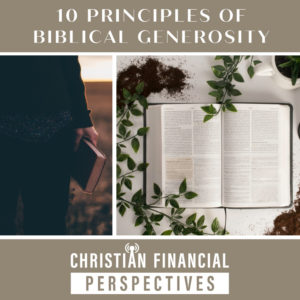Click below to listen to Episode 95 – 10 Principles of Biblical Generosity
Subscribe: Apple Podcasts | Google Podcasts | Spotify | Amazon Music | Stitcher | RSS | More
10 Principles of Biblical Generosity
Are you someone who gives your finances and your time out of a cheerful heart, or is it something you feel obligated to do? This episode discusses what the Bible says about the importance of giving generously. There are actually over 2300 verses in the Bible that talk about giving, money, and possessions! That is a lot of time spent writing about the significance of giving and doing it with a joyful heart.
Giving generously is a very important subject in the Bible and one on which Jesus frequently spoke. It shows our faith to God and that we trust in him for support. Plus, doesn’t all of our money belong to God anyways? “10 Principles of Biblical Giving” is based on 10 giving principles that The National Christian Foundation came up with. These include:
1. God is absolutely good
2. God owns everything
3. God created us to bear his image
4. Giving brings transformation
5. Jesus is enough
6. God is our never ending supply
7. Giving is a form of worship
8. The motive matters more than the money
9. What we do now is of eternal importance because tomorrow is not guaranteed
10. Time is of the essence, not of in the future
HOSTED BY: Bob Barber, CWS®, CKA®
CO-HOST: Bailey Theaker
Mentioned In This Episode
Want to ask a question about your specific situation? Schedule a complimentary 15 minute phone call.
EPISODE TRANSCRIPT
[INTRODUCTION]
Welcome to “Christian Financial Perspectives”, where you’re invited to gain insight, wisdom and knowledge about how Christians integrate their faith, life and finances with a Biblical Worldview. Here’s your host Christian Investment Advisor, Financial Planner, and Coach, Bob Barber.
[EPISODES]
Bob:
Welcome to the 95th podcast of Christian Financial Perspectives, 95. These numbers keep getting closer and closer to a hundred. That’s a lot of hours of listening to me.
Bailey:
It’s a lot of good information in there.
Bob:
I hope so. Well today we’re going to share the “10 Principles of Biblical Generosity”. This is something I was telling you about earlier today. I get a weekly email from the National Christian Foundation and I’ve had them on the podcast several times in the past speaking about unique ways of giving assets. I mean, there’s just so many different ways to give today. It’s not just from cash, but it’s through your stocks, it’s through land, it’s through IRAs, many, many different ways. When we speak of 10 principles of biblical generosity, this was an article I got. It was called that. And I looked at it and these really came out at me and I said, this would be a really good podcast to bring to Christian Financial Perspectives because, I mean, the title kind of struck me – 10 principles of biblical generosity. What could that be?
Bailey:
Yeah. I read through some of their points as well. And so much of what they said was just solid gold. I mean, one of their quotes said, we believe biblical generosity is much more than a financial transaction. It’s a spiritual practice that has the power to transform every major area of our lives. When our giving is rooted in scripture and responsive to God, we draw closer to his purpose for our life, bearing the image of Christ.
Bob:
Yes, it is. It’s so much more, like you say, than just a financial transaction. It’s really what our love relationship is with the Father, with the creator of the universe, the Maker, with God. And so we’re going to get into these 10 principles. I’m telling you, I think you’re gonna really like these. These things you may not have heard, but maybe a lot of them you have. You’re going to hear some scriptures. Some of my favorite ones are in this one too, but it never hurts to hear God’s word again. So we’ve got these 10 principles, and so Bailey start off with the first one.
Bailey:
Yeah. So principle number one is that God is absolutely good. And this is rooted in one of my favorite scriptures, probably one that you’ve all heard before, have committed to memory, but it’s John 3:16 and it says, “For God so loved the world that he gave his only son that whoever believes in him should not perish but have eternal life.” And our God is a God of unimaginable love and generosity. And he gave his son for us, the ultimate gift. Beyond love and generosity, that gift also demonstrated God’s justice and his mercy toward us, and his enduring trustworthiness to provide everything that we need for life and godliness. And I love that this is the first point that they chose to start with because it really just brings everything back to that focal point that the gospel is at the center of everything. It all comes back to Jesus.
Bob:
It is, it is. And that is the ultimate gift. I mean, you give your son, and God gave his son and came down here amongst us to live on this earth to see what we have to go through. God didn’t have to do that, but he did it because he loved us, because he’s a giving God. So the heart of God is giving. He’s absolutely good. The second point in here is that God owns everything and you’ve heard me mentioned many times here, anyone that’s listened to even 10 of my podcasts, they know my favorite scriptures is Psalms 24:1. It’s one of them. It’s that, “The earth is the Lord’s and everything in it.” And then the second verses is, “All who live in it for, he founded it on the seas and established it on the waters.” Everything. Just think of God’s hand and he’s holding you. He’s holding the whole earth and he’s holding you in that. And every single thing we have belongs to him, and there was another scripture that they were using in these 10 principles is from Romans 12:1, “In view of God’s mercy, offer your body as a living sacrifice, holy and pleasing to God, for this is the true and proper worship.” And if God owns it, owns everything, and we love him, then in view that mercy offer ourselves to him. And it’s not just ourselves, but everything that God has given us because our bodies are from the Holy Spirit, and the Holy Spirit dwells within us when we’re a believer and we’ve receive God as our Lord and Savior. And if you don’t know Christ as your Lord and Savior, there’s nothing more exciting than knowing him. And it’s so simple. Wherever you are, even if you’re driving, don’t close your eyes while you’re driving, but even if you’re driving, you say, Lord, I made a mess of this on my own. I need you. Just give it to God because he’s the author of life. He wants to come in and be with you, and his Holy Spirit to guide you in. When you believe God owns it all, he holds the rights to it all. It’s all his, and this not just includes our possessions, but our bodies and our minds and our whole life. What’s interesting is before I came to Christ, like all of us, we’re a slave to sin, but then God comes in and redeems us. And he paid for that sin through his son, Jesus Christ, dying on the cross for us. When I think about it and when I was seeing this, there’s a quote in here that’s kind of interesting that we’re doubly owned. God owns us and then Christ sealed that with his death and resurrection on the cross by giving his blood to cover over our sins. So we’re doubly owned. Isn’t that cool?
Bailey:
I love that. Well, principle number three is that God created us to bear his image in Genesis 1 it says, “Then God said, let us make man in our image after our likeness and let them have dominion over the fish of the sea and over the birds of the heavens and over the livestock and over all of the earth and over every creeping thing that creeps on the earth. So God created man in his own image, in the image of God he created him, male and female he created them.” God designed us to look like him and to reflect his goodness in the world. When we get to set our focus on him as the creator and us as the creation, then we get to live our lives as children of God and living our lives with an awareness of that, that I’m God’s kid, that he’s looking after me, that he cares for my needs. There’s a joy and a freedom that comes with that that’s unlike anything I’ve ever experienced. One of the ways that we look like God is by being a generous people. I mean, he’s a generous God. You can’t out give God. And so we get to look like him by being a generous people and by reflecting his nature of stewardship and generosity
Bob:
Principle number four is how that giving brings a transformation in our lives. When we become a giver, it transforms us ,because it’s hard to be giving and selfish at the same time. And Christ was not selfish. He gave. God gave. Like Romans 12 is a very good scripture. Romans 12:2 says, “Do not conform to the pattern of this world, but be transformed.” Okay. Giving brings transformation, “but be transformed by the renewing of your mind. Then you will be able to test and approve what God’s will is, his good and pleasing and perfect will.” So we’re called from the scripture to be transformed and allow God to shape our minds to the mind of Christ and to accept God’s view of the world, we need to make our thoughts obedient to God’s purposes. Giving is a supernatural, transformative step-by-step process of learning and agreeing to trust God in his ways over our selfish ways. And there’s another scripture here from Timothy 6:17-19 that says, “Command those who are rich in this present world.” So those of us that have been given a lot that are wealthy in this present world, “not to be arrogant nor to put their hope in that wealth,” because that wealth can disappear, which is so uncertain, “but to put their hope in God who richly provides us with everything for an enjoyment, command them to do good, to be rich in good deeds and to be generous and willing to share. In this way, they will lay up treasure for themselves in heaven as a firm foundation for the coming age so that they make take hold of life that is truly life.” So when we’re giving, it’s like sending a treasure in front of us, sending a treasure to heaven.
Bailey:
That’s so good. That’s so good. And to piggyback on that, the next point is is just that Jesus is enough. You said to not put our hope, if you’ve been given a lot, in this world. That’s wonderful, but to not put your hope in that, because that’s not going to sustain you, but there is someone who will and it’s Jesus, and he is more than enough. Psalm 23 says, “The Lord is my shepherd I shall not want.” Because we have a good shepherd who cares for our needs, who sees us and knows what we need, we don’t need to want for anything. We have everything that we could ever need. Psalm 23 is one of my favorite passages of scripture. I mean, you could take every line of that scripture and live by it day by day. But I love that he says that, “I’ve prepared a table for you in the presence of your enemies.” And so it’s like, not only am I going to want for nothing, but God has prepared a feast. And then a place at that feast for you to sit in the presence of your enemies. Like not only does he feed his kids, but he feeds them good food, right? Like he gives them a feast to eat.
Bob:
I love that. Jesus is enough. We don’t need anything else. We’ve got Christ. Boy, that is so opposite from a secular viewpoint, because the secular viewpoint is you need more and more and more and more and more. But here it is saying that Jesus is enough. Principle number six of giving generously is God is our never ending supply. Deuteronomy 8:17-19. This is a scripture I’ve quoted in some biblical workshops I’ve done in churches. “You may say to yourself, my power and strength and my hands have produced this wealth for me. But remember the Lord your God, for it is he who gives you the ability to produce wealth.” Let me read that one more time. “You may say to yourself, my power and my strength and my hands have produced this wealth for me. But remember the Lord your God, for it is he who gives you the ability to produce wealth, and so confirms his covenant, which he swore to your ancestors as it is today.” This passage reminds all of us that we can never forget why we have life, why we experience any success, even material successes, because God has allowed us to have that, and God gives us the ability to produce wealth. There’s another scripture that goes along with this, and it’s talking about testing God in generous giving. And we’ve spoken of this before, but it’s a well-known scripture. It’s there in Malachi, Malachi 3:10-11, “Bring the whole tithe into the storehouse that there may be food in my house.” And what is God saying? “Test me in this.” It’s the only place in scripture says that. “And see if I will not throw open the flood gates of heaven and pour out so much blessing, there will not be enough room to even store it. I will prevent pests from devouring your crops.” Now, maybe we don’t have crops today, but he’ll prevent those things from happening that would pull away from that. “And the vines in your field will not drop their fruit before it is ripe.” Tell me it, that’s a powerful, powerful scripture that says we can actually test God in our giving. And then I have another one I want to share, cause I love some of these scriptures on sharing, is 2 Corinthians 9:6-8, “Whoever sows sparingly will also reap sparingly.” So if you’ve been stingy, it’s not saying that, is it? “Whoever sows sparingly will also reap sparingly and whoever sows generously will also reap generously. Each of you should give what you’ve decided in your heart to give, not reluctantly or under compulsion, for God loves a cheerful giver. And God is able to bless you abundantly, so that in all things and at all times, having all that you need, you will abound in every good work.” So remember, God loves a cheerful heart and realize that this scriptural principle of whoever sows sparingly will also reap sparingly.
Bailey:
And I love that. I love that it talks about the cheerful heart that you can give with. And so the next point is giving is a form of worship. My husband and I are planting a church in San Marcos, and we’re really intentional about the words we use. When we’re talking about church. We don’t call Sunday gatherings “church” because the church is a people, it’s not a gathering. And we don’t call the music that we play “worship” because worship is so many other things. It’s not just singing. And I love that this talks about generosity being a form of worship. Acts 17:25 says, “Nor is he served by human hands as though he needed anything since he gives himself to all mankind, life and breath and everything.” The National Christian Foundation said it like this, “When we give generously and sacrificially, it’s not because God needs anything from us, but because we want to show our love for him. Giving is an expression of obedience. Yes, but also of gratitude, trust, and increasing joy. God seeks out and recognizes those who worship him this way.”
Bob:
That’s powerful, isn’t it? It’s very powerful when they say that, that it’s not because God needs anything. God owns it all. And it all belongs to him. But it’s showing our love for him. I don’t think I’ve ever seen it anywhere written that giving is a form of worship. Have you ever seen it written anywhere like that?
Bailey:
No, I don’t think so.
Bob:
I don’t think so either. If anything, in all these principles, I think that this might be one of the most important principles to remember of the 10 principles of biblical generosity, that giving is a form of worship. Principle number eight. We’re just about done. I mean, we’ve already gone through seven of these now. Principle number eight is the motive matters more than the money. Think about the widow’s offering. We’ve heard this story in Mark 12. I’ve heard it all my life. Mark 12:41-44, “Jesus sat down near the collection box in the temple and watched as the crowds dropped in their money. Many rich people put in large amounts. Then a poor widow came and dropped in just two small coins.” I shouldn’t say just two. “Jesus called his disciples and said, I’ll tell you the truth. This widow has given more than all the others who are making contributions, for they gave just a tiny part of their surplus, but she, poor as she is, she gave everything she had.” Now, you think about when you hear these billionaires, Oh, they gave 1% of that billion, but she gave 100% of her pennies. So, that is truly having the right motive of giving. It’s always struck me as it’s not the amount, but it’s the motive. So what’s the reason for giving? Is it to please man and so you can get your name on a big building and for the world to pat you on the back, or is it to seek God’s heart? Acts 20:35, “In everything I did, I showed you that by this kind of hard work, we must help the weak remembering the words, the Lord Jesus himself said, it’s more blessed to give than receive.” So giving, it measures our hearts, which God sees clearly. And Jesus always said, there’s more blessing in giving than getting, but you only know this if you’ve experienced it in doing it yourself.
Bailey:
Principle number nine is what we do now is of eternal consequence because tomorrow is not guaranteed.
Bob:
None of us know about tomorrow.
Bailey:
Amen. Matthew 6:19-21 says, “Do not lay up for yourselves treasures on earth, where moth and rust destroy, where thieves break in and steal, but lay up for yourselves treasures in heaven, where neither moth nor rust destroys and where thieves do not break in and steal, for where your treasure is, there your heart will also be.” Nothing on earth really lasts, not your money or our things, not even our bodies. And this earth is not the home that we’re destined to live in forever. But we do have a home that lasts forever in the kingdom of God. And when we set our eyes on that eternity, we’re so freed up here on this earth to be generous with the time and the resources that we have.
Bob:
Amen. And then we come down to the last principle. The 10th principle is biblical generosity. Time is of the essence, not of the future. James 4:13-15 says, “Now, listen you who say today or tomorrow, we go do this or that in that city. Spend a year there, carry on business, and make money, while you do not even know what will happen tomorrow. What is your life? You are a mist that appears for a little while and then vanishes. Instead, you ought to say, if it’s the Lord’s will we will live and do this or that.” So even though we’re promised eternity, really none of us even know if we have another day here on this earth. There is a time for everything and it’s never too late to start. And the Bible communicates a clear sense of urgency when it comes to giving.
Bob:
And we’re called to do it wisely during the days that God’s given us. 1 Timothy 6:17 and we’ll end on this, “Tell those that are rich in this world not to be proud and not to trust in all that money. Money could not be trusted. They should put their trust in God. He gives us all we need for our happiness.” So there you have it, 10 principles of biblical generosity. First one, God is absolutely good. Next, God owns everything. Third principle, God created us to bear his image. The fourth, giving brings transformation. The fifth, Jesus is enough. The sixth, God is our never ending supply. The seventh, giving is a form of worship. The eighth, the motive matters more than the money. Number nine, what we do now is of internal importance, and time is of the essence, not of in the future.
Bailey:
Amen. Well, if any of our listeners are looking for Christian financial advisors to help you in all of the unique ways that there are to give, you can give us a call at (830) 609-6986, or visit us online christianfinancialadvisors.com.
[CONCLUSION]
That’s all for now.
We invite you to listen to all of our past episodes covering many financial topics from a Christian Perspective. To make sure you don’t miss any of Bob’s upcoming episodes you can subscribe to Christian Financial Perspectives on iTunes, Google Play Music, Spotify, or Stitcher. To learn more about integrating your faith with your finances, visit ciswealth.com or call 830-609-6986.
[DISCLOSURES]
Investment advisory services offered through Christian Investment Advisors Inc dba Christian Financial Advisors, a registered investment advisor registered with the SEC. Registration as an investment advisor does not imply a certain level of skill or training. Comments from today’s show are for informational purposes only and not to be considered investment advice or recommendations to buy or sell any company that may have been mentioned or discussed. The opinions expressed are solely those of the hosts, Bob Barber and Shawn Peters, and their guests. Bob and Shawn do not provide tax advice and encourage you to seek guidance from a tax professional. While Christian Financial Advisors believes the information to be accurate and reliable, we do not claim or have responsibility for its completeness, accuracy, or reliability.












